初一英语介词练习题(最新整理)
七年级英语(完整版)介词练习题附解析
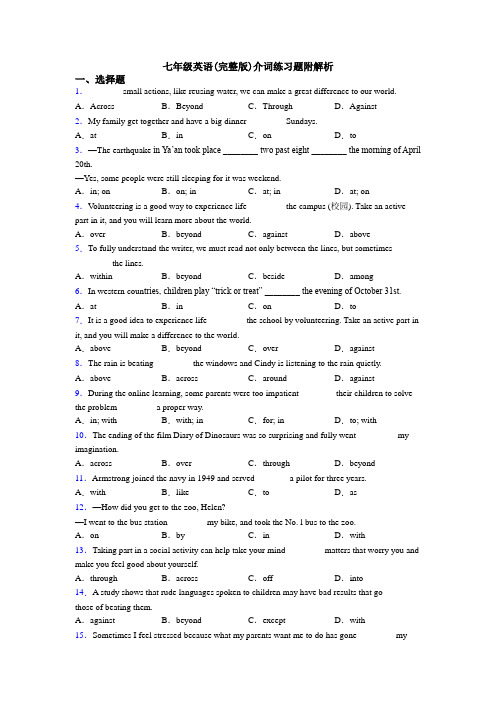
七年级英语(完整版)介词练习题附解析一、选择题1.________small actions, like reusing water, we can make a great difference to our world. A.Across B.Beyond C.Through D.Against2.My family get together and have a big dinner ________ Sundays.A.at B.in C.on D.to3.—The earthquake in Ya’an took place ________ two past eight ________ the morning of April 20th.—Yes, some people were still sleeping for it was weekend.A.in; on B.on; in C.at; in D.at; on4.V olunteering is a good way to experience life ________ the campus (校园). Take an active part in it, and you will learn more about the world.A.over B.beyond C.against D.above5.To fully understand the writer, we must read not only between the lines, but sometimes________ the lines.A.within B.beyond C.beside D.among6.In western coun tries, children play “trick or treat” ________ the evening of October 31st. A.at B.in C.on D.to7.It is a good idea to experience life ________ the school by volunteering. Take an active part in it, and you will make a difference to the world.A.above B.beyond C.over D.against8.The rain is beating ________ the windows and Cindy is listening to the rain quietly. A.above B.across C.around D.against9.During the online learning, some parents were too impatient________ their children to solve the problem ________ a proper way.A.in; with B.with; in C.for; in D.to; with10.The ending of the film Diary of Dinosaurs was so surprising and fully went ________ my imagination.A.across B.over C.through D.beyond 11.Armstrong joined the navy in 1949 and served _______ a pilot for three years.A.with B.like C.to D.as12.—How did you get to the zoo, Helen?—I went to the bus station ________ my bike, and took the No. l bus to the zoo.A.on B.by C.in D.with13.Taking part in a social activity can help take your mind ________ matters that worry you and make you feel good about yourself.A.through B.across C.off D.into14.A study shows that rude languages spoken to children may have bad results that go ________ those of beating them.A.against B.beyond C.except D.with 15.Sometimes I feel stressed because what my parents want me to do has gone ________ myability.A.through B.against C.above D.beyond16.He was born ________ Feburary, the coldest month of a year in this city.A.on B.in C.at D.over 17.Xinjiang cotton is praised ________ the best cotton in the country ________ its high quality. A.for; as B.for; by C.as; for D.by; for18.—It’s raining heavily outside. May I push my bicycle into your house?—Certainly. But please put it _________ the wall so that it won’t take up too much space.A.in B.on C.against D.over 19.Everyone was touched ________ words after they watched the film Hi, MOM 《你好,李焕英》directed by Jia Ling.A.under B.across C.beyond D.against 20.—You look frightened, what’s up?— A terrible accident happened this morning. A truck was running fast when an old man was about to cross the road. I bet he will not live ________ the night.A.along B.away C.through D.in21.If your temperature is_______37.3°, you should go to the doctor instead of going to school. A.above B.against C.under D.below 22.Xuzhou Metro Line 2 came into use ________ November 28, 2020, it is one of the most important events in our daily life.A.at B.in C.on D.for 23.—Thanks for looking after me ________ my illness, Millie.—Don’t mention it. That’s wh at friends are for.A.through B.among C.with D.across24.New York City, also known ________ Big Apple, becomes one of the world’s greatest business and cultural centers.A.as B.by C.for D.to25.The teacher encouraged the students to tell the story ________ English.A.at B.with C.in D.for26.________ a spring morning, a bird flew into our classroom and we were very excited to see it. A.In B.On C.At D.For27.If success is a gate, the road ________ this gate must be full of difficulties.A.beyond B.opposite C.towards D.across28.— Would you like to visit the zoo with me now?—Sorry, it’s _______ the visiting hours. Let’s go there tomorrow.A.beyond B.through C.during D.on29.He has developed a good habit of running ________ the lake every morning.A.over B.along C.beyond D.across30.In the end, Mr Song came up____a good method to solve the problem.A.for B.at C.in D.with31.Let’s vote ________ China’s Inspirational Role Models(感动中国人物) ________ the Internet, shall we?A.for; in B.to; on C.on; over D.for; on 32.Switzerland lies ________ France, Germany, Austria and Italy.A.between B.among C.against D.beyond33.—I’ve been a League member for about two years. What about you?—I joined the League ___________May, 2017.A.in B.on C.at D.by34.When are you arriving? I’ll pick you up the station.A.at B.to C.on D.off35.— What do you think of those smart kids in the game show?— There is no doubt that many of them have a gift ________ maths.A.for B.in C.on D.at36.—Jack, you should put the things away in your room. It is ________ a terrible mess!—OK, I’m coming, Mum!A.on B.at C.in D.for37.—There have been great changes in Taizhou in the past few years.—I can't agree more. The changes there are ________ my imagination.A.near B.past C.along D.beyond38.The exercise was __________ the abilities of most students, so very few could work it out. A.beyond B.over C.against D.through39.You shouldn’t eat so much chocolate _________ meals. Because it will affect your appetite. A.except B.through C.between D.unless40.—I haven’t been to Shenzhen for years.—You really need to pay a visit, and you’ll find changes there are ________ imagination. A.beyond B.through C.without D.for【参考答案】一、选择题1.C解析:C【详解】句意:通过一些小的行动,比如重新利用水,我们可以给我们的世界带来巨大的变化。
初一英语介词练习题30题
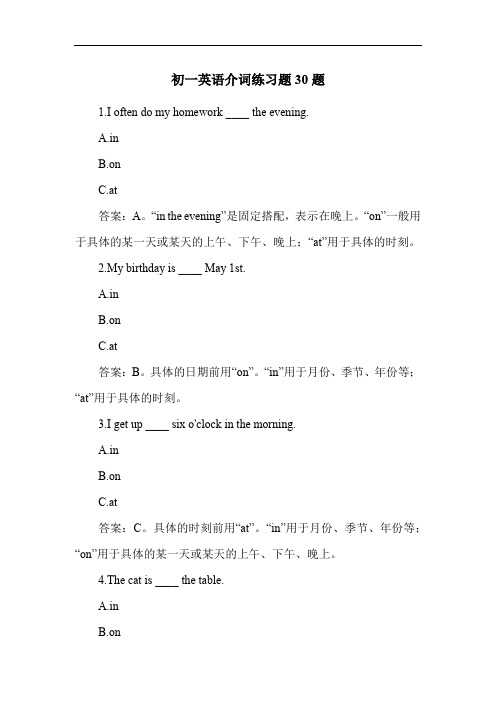
初一英语介词练习题30题1.I often do my homework ____ the evening.A.inB.onC.at答案:A。
“in the evening”是固定搭配,表示在晚上。
“on”一般用于具体的某一天或某天的上午、下午、晚上;“at”用于具体的时刻。
2.My birthday is ____ May 1st.A.inB.onC.at答案:B。
具体的日期前用“on”。
“in”用于月份、季节、年份等;“at”用于具体的时刻。
3.I get up ____ six o'clock in the morning.A.inB.onC.at答案:C。
具体的时刻前用“at”。
“in”用于月份、季节、年份等;“on”用于具体的某一天或某天的上午、下午、晚上。
4.The cat is ____ the table.A.inB.onC.under答案:C。
猫在桌子下面,用“under”。
“in”表示在……里面;“on”表示在……上面。
5.The book is ____ the desk.A.inB.onC.at答案:B。
书在桌子上面,用“on”。
“in”表示在……里面;“at”用于具体的地点或时刻。
6.I go to school ____ Monday.A.inB.onC.at答案:B。
具体的某一天用“on”。
“in”用于月份、季节、年份等;“at”用于具体的时刻。
7.The boy is standing ____ the tree.A.inB.onC.beside答案:C。
男孩站在树旁边,用“beside”。
“in”表示在……里面;“on”表示在……上面。
8.The ball is ____ the box.A.inB.onC.at答案:A。
球在盒子里面,用“in”。
“on”表示在……上面;“at”用于具体的地点或时刻。
9.The picture is ____ the wall.A.inB.onC.at答案:B。
初一英语介词用法总结练习题30题
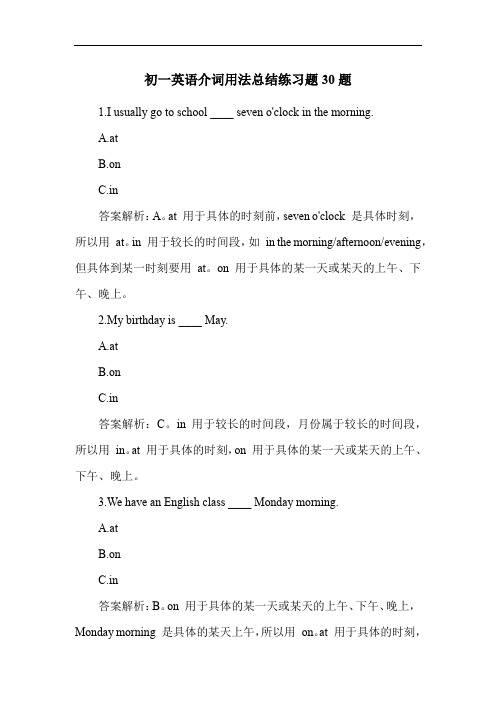
初一英语介词用法总结练习题30题1.I usually go to school ____ seven o'clock in the morning.A.atB.onC.in答案解析:A。
at 用于具体的时刻前,seven o'clock 是具体时刻,所以用at。
in 用于较长的时间段,如in the morning/afternoon/evening,但具体到某一时刻要用at。
on 用于具体的某一天或某天的上午、下午、晚上。
2.My birthday is ____ May.A.atB.onC.in答案解析:C。
in 用于较长的时间段,月份属于较长的时间段,所以用in。
at 用于具体的时刻,on 用于具体的某一天或某天的上午、下午、晚上。
3.We have an English class ____ Monday morning.A.atB.onC.in答案解析:B。
on 用于具体的某一天或某天的上午、下午、晚上,Monday morning 是具体的某天上午,所以用on。
at 用于具体的时刻,in 用于较长的时间段。
4.My father often reads newspapers ____ night.A.atB.onC.in答案解析:A。
at night 是固定搭配,表示在晚上。
on 用于具体的某一天或某天的上午、下午、晚上,in 用于较长的时间段。
5.The meeting will start ____ three o'clock this afternoon.A.atB.onC.in答案解析:A。
at 用于具体的时刻前,three o'clock this afternoon 是具体时刻,所以用at。
in 用于较长的时间段,on 用于具体的某一天或某天的上午、下午、晚上。
6.She is playing basketball ____ the playground.A.atB.onC.in答案解析:B。
初一英语介词用法总结练习题30题含答案解析
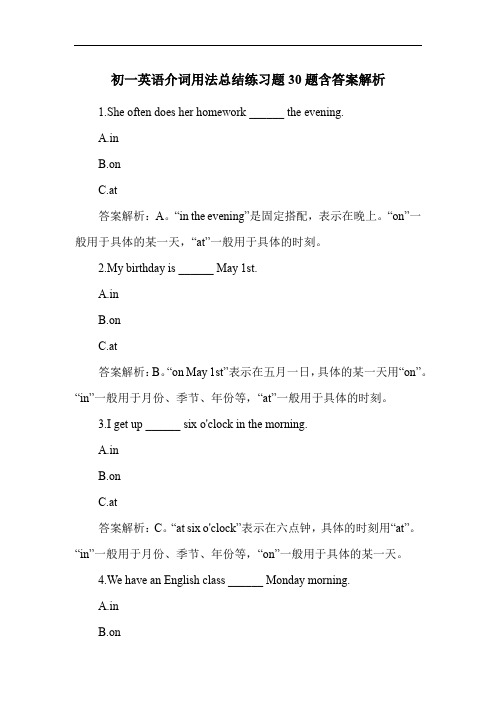
初一英语介词用法总结练习题30题含答案解析1.She often does her homework ______ the evening.A.inB.onC.at答案解析:A。
“in the evening”是固定搭配,表示在晚上。
“on”一般用于具体的某一天,“at”一般用于具体的时刻。
2.My birthday is ______ May 1st.A.inB.onC.at答案解析:B。
“on May 1st”表示在五月一日,具体的某一天用“on”。
“in”一般用于月份、季节、年份等,“at”一般用于具体的时刻。
3.I get up ______ six o'clock in the morning.A.inB.onC.at答案解析:C。
“at six o'clock”表示在六点钟,具体的时刻用“at”。
“in”一般用于月份、季节、年份等,“on”一般用于具体的某一天。
4.We have an English class ______ Monday morning.A.inB.onC.at答案解析:B。
“on Monday morning”表示在星期一早上,具体的某一天的上午、下午、晚上用“on”。
“in”一般用于月份、季节、年份等,“at”一般用于具体的时刻。
5.The school trip is ______ April.A.inB.onC.at答案解析:A。
“in April”表示在四月,月份用“in”。
“on”一般用于具体的某一天,“at”一般用于具体的时刻。
6.My father was born ______ 1980.A.inB.onC.at答案解析:A。
“in 1980”表示在1980 年,年份用“in”。
“on”一般用于具体的某一天,“at”一般用于具体的时刻。
7.The concert will start ______ 7:30 pm.A.inB.onC.at答案解析:C。
初一英语介词搭配练习题40题(带答案)
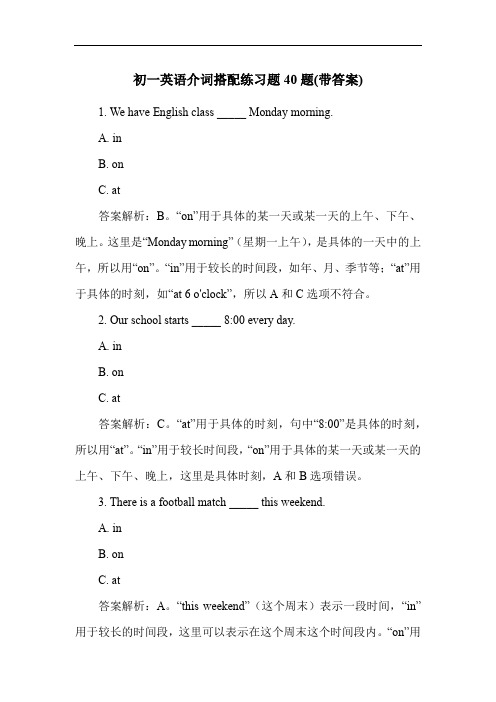
初一英语介词搭配练习题40题(带答案)1. We have English class _____ Monday morning.A. inB. onC. at答案解析:B。
“on”用于具体的某一天或某一天的上午、下午、晚上。
这里是“Monday morning”( 星期一上午),是具体的一天中的上午,所以用“on”。
“in”用于较长的时间段,如年、月、季节等;“at”用于具体的时刻,如“at 6 o'clock”,所以A和C选项不符合。
2. Our school starts _____ 8:00 every day.A. inB. onC. at答案解析:C。
“at”用于具体的时刻,句中“8:00”是具体的时刻,所以用“at”。
“in”用于较长时间段,“on”用于具体的某一天或某一天的上午、下午、晚上,这里是具体时刻,A和B选项错误。
3. There is a football match _____ this weekend.A. inB. onC. at答案解析:A。
“this weekend” 这个周末)表示一段时间,“in”用于较长的时间段,这里可以表示在这个周末这个时间段内。
“on”用于具体某一天,“at”用于具体时刻,所以B和C选项不合适。
4. The students play games _____ recess.A. inB. onC. at答案解析:C。
“at recess”是固定搭配,表示“在课间休息时”。
“in”用于较长时间段,“on”用于具体某一天或某一天的上午、下午、晚上,这里不符合A和B选项的介词用法。
5. My sister was born _____ May.A. inB. onC. at答案解析:A。
“in”用于月份,“May”( 五月)是月份,所以用“in”。
“on”用于具体某一天,“at”用于具体时刻,B和C选项不符合。
6. We usually have a meeting _____ Friday afternoon.A. inB. onC. at答案解析:B。
初一英语介词用法总结练习题20题(带答案)
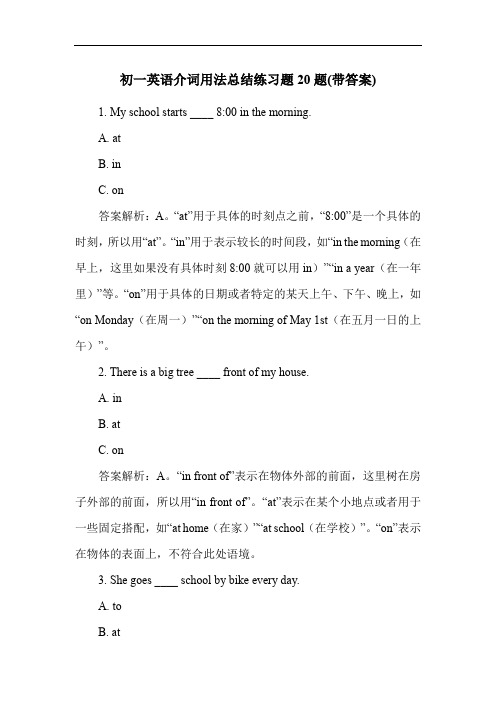
初一英语介词用法总结练习题20题(带答案)1. My school starts ____ 8:00 in the morning.A. atB. inC. on答案解析:A。
“at”用于具体的时刻点之前,“8:00”是一个具体的时刻,所以用“at”。
“in”用于表示较长的时间段,如“in the morning( 在早上,这里如果没有具体时刻8:00就可以用in)”“in a year 在一年里)”等。
“on”用于具体的日期或者特定的某天上午、下午、晚上,如“on Monday 在周一)”“on the morning of May 1st 在五月一日的上午)”。
2. There is a big tree ____ front of my house.A. inB. atC. on答案解析:A。
“in front of”表示在物体外部的前面,这里树在房子外部的前面,所以用“in front of”。
“at”表示在某个小地点或者用于一些固定搭配,如“at home( 在家)”“at school( 在学校)”。
“on”表示在物体的表面上,不符合此处语境。
3. She goes ____ school by bike every day.A. toB. atC. in答案解析:A。
“go to school”是固定搭配,表示去上学,“to”表示方向,指向学校这个目的地。
“at”和“in”不符合这个搭配的用法。
4. My birthday is ____ July.A. inB. onC. at答案解析:A。
“in”用于表示在某个月份,“July( 七月)”是月份,所以用“in”。
“on”用于具体日期,“at”用于具体时刻,都不符合这里的用法。
5. The cat is sleeping ____ the chair.A. underB. inC. on答案解析:A。
“under”表示在物体的下方,猫在椅子下面睡觉,所以用“under”。
初中英语介词题20套(带答案)含解析

初中英语介词题20套(带答案)含解析一、初中英语介词1.The earth goes _____ the sun.A. aroundB. throughC. betweenD. across【答案】A【解析】【分析】句意:地球绕着太阳转。
A. around围绕、环绕;B. through穿过,表示从事物内部穿过;C. between在…两者之间;D. across横穿,表示从事物外部一边到另一边。
根据句意“地球绕着太阳转。
”go around表示绕着......转,故答案为A。
【点评】考查介词辨析。
掌握介词意义和一些固定搭配的用法。
2.—Is there ________ in today's morning news on CCTV-1?—Yes, France Team beat Korea Team by 4: 0 in the 8`h FIFA Women's World Cup in France ________ June 8, 2019.A. anything special; onB. something special; inC. special something; onD. anything special; in【答案】 A【解析】【分析】句意:——在央视一今日新闻里有特殊的事情吗?——是的。
法国队在2019年6月8日的法国第八届女子足球世界杯中以4:比0的成绩击败了韩国队。
复合不定代词+形容词,排除B、C。
问句是一般疑问句,所以用anything;on+几月几日,June 8 是几月几日,具体日期,所以用on,故选A。
【点评】考查复合不定代词及介词用法,注意平时识记,理解句意。
3.—Shall I help you ________ the street, Grandpa?—No, thanks. I can manage it myself.A. onB. withC. acrossD. along【答案】 C【解析】【分析】句意:——爷爷,我可以帮助你过马路吗?——不用,谢谢。
初一英语介词练习题40题答案解析版
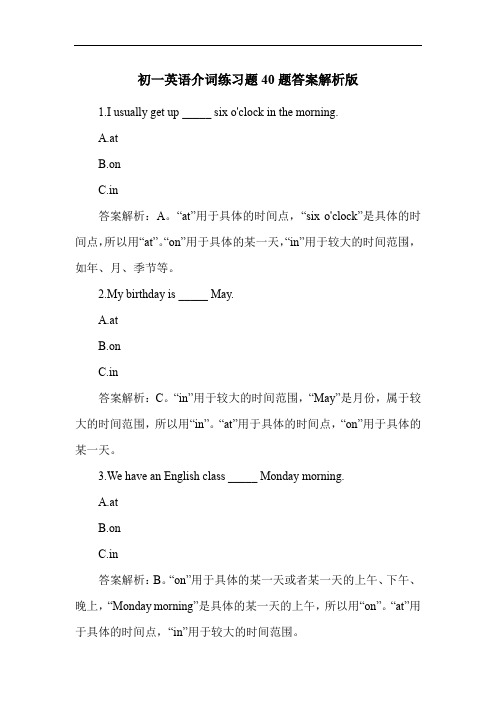
初一英语介词练习题40题答案解析版1.I usually get up _____ six o'clock in the morning.A.atB.onC.in答案解析:A。
“at”用于具体的时间点,“six o'clock”是具体的时间点,所以用“at”。
“on”用于具体的某一天,“in”用于较大的时间范围,如年、月、季节等。
2.My birthday is _____ May.A.atB.onC.in答案解析:C。
“in”用于较大的时间范围,“May”是月份,属于较大的时间范围,所以用“in”。
“at”用于具体的时间点,“on”用于具体的某一天。
3.We have an English class _____ Monday morning.A.atB.onC.in答案解析:B。
“on”用于具体的某一天或者某一天的上午、下午、晚上,“Monday morning”是具体的某一天的上午,所以用“on”。
“at”用于具体的时间点,“in”用于较大的时间范围。
4.The meeting will start _____ 3 pm.A.atB.onC.in答案解析:A。
“at”用于具体的时间点,“3 pm”是具体的时间点,所以用“at”。
“on”用于具体的某一天,“in”用于较大的时间范围。
5.My father often goes to work _____ the morning.A.atB.onC.in答案解析:C。
“in”用于较大的时间范围,“the morning”是较大的时间范围,所以用“in”。
“at”用于具体的时间点,“on”用于具体的某一天。
6.We will have a party _____ Christmas Day.A.atB.onC.in答案解析:B。
“on”用于具体的某一天,“Christmas Day”是具体的某一天,所以用“on”。
“at”用于具体的时间点,“in”用于较大的时间范围。
初一英语介词练习题30题含答案解析
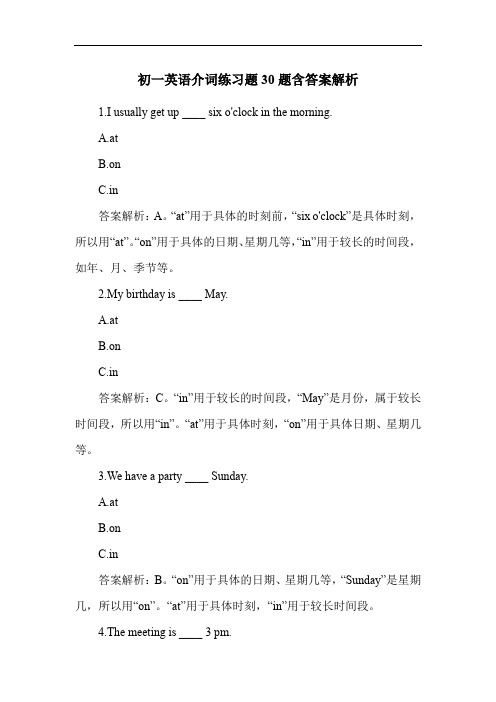
初一英语介词练习题30题含答案解析1.I usually get up ____ six o'clock in the morning.A.atB.onC.in答案解析:A。
“at”用于具体的时刻前,“six o'clock”是具体时刻,所以用“at”。
“on”用于具体的日期、星期几等,“in”用于较长的时间段,如年、月、季节等。
2.My birthday is ____ May.A.atB.onC.in答案解析:C。
“in”用于较长的时间段,“May”是月份,属于较长时间段,所以用“in”。
“at”用于具体时刻,“on”用于具体日期、星期几等。
3.We have a party ____ Sunday.A.atB.onC.in答案解析:B。
“on”用于具体的日期、星期几等,“Sunday”是星期几,所以用“on”。
“at”用于具体时刻,“in”用于较长时间段。
4.The meeting is ____ 3 pm.B.onC.in答案解析:A。
“at”用于具体的时刻,“3 pm”是具体时刻,所以用“at”。
“on”用于具体日期、星期几等,“in”用于较长时间段。
5.My mother goes shopping ____ the morning of Saturday.A.atB.onC.in答案解析:B。
“on”用于具体的日期、星期几的上午、下午、晚上等,“the morning of Saturday”是具体的星期六上午,所以用“on”。
“at”用于具体时刻,“in”用于较长时间段。
6.The concert is ____ winter.A.atB.onC.in答案解析:C。
“in”用于较长的时间段,“winter”是季节,属于较长时间段,所以用“in”。
“at”用于具体时刻,“on”用于具体日期、星期几等。
7.I was born ____ 2008.A.atB.on答案解析:C。
初一英语介词练习题40题(带答案)
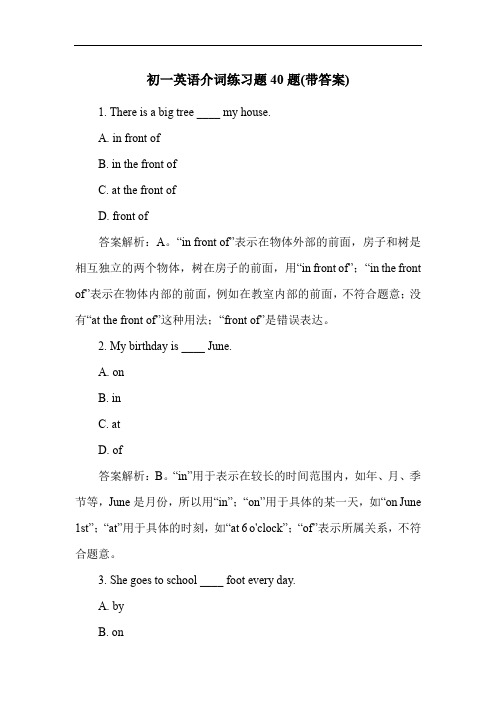
初一英语介词练习题40题(带答案)1. There is a big tree ____ my house.A. in front ofB. in the front ofC. at the front ofD. front of答案解析:A。
“in front of”表示在物体外部的前面,房子和树是相互独立的两个物体,树在房子的前面,用“in front of”;“in the front of”表示在物体内部的前面,例如在教室内部的前面,不符合题意;没有“at the front of”这种用法;“front of”是错误表达。
2. My birthday is ____ June.A. onB. inC. atD. of答案解析:B。
“in”用于表示在较长的时间范围内,如年、月、季节等,June是月份,所以用“in”;“on”用于具体的某一天,如“on June 1st”;“at”用于具体的时刻,如“at 6 o'clock”;“of”表示所属关系,不符合题意。
3. She goes to school ____ foot every day.A. byB. onC. withD. in答案解析:B。
“on foot”是固定搭配,表示步行;“by”后面接交通工具时,直接接交通工具名词,如“by bus”;“with”表示和……一起或者用……工具,不符合题意;“in”通常不用于表示步行这种交通方式。
4. The book is ____ the desk.A. onB. aboveC. overD. up答案解析:A。
“on”表示在物体表面上,书在桌子表面,所以用“on”;“above”表示在上方,不一定垂直,强调高于;“over”表示垂直上方,通常有覆盖的意思;“up”表示向上的方向,不是介词表示位置关系的用法。
5. I often get up ____ six o'clock in the morning.A. atB. onC. inD. for答案解析:A。
初一英语介词用法练习题50题(答案解析)
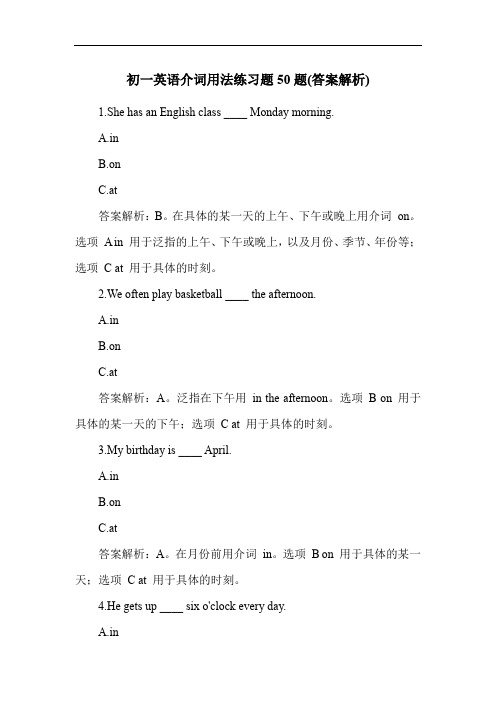
初一英语介词用法练习题50题(答案解析)1.She has an English class ____ Monday morning.A.inB.onC.at答案解析:B。
在具体的某一天的上午、下午或晚上用介词on。
选项 A in 用于泛指的上午、下午或晚上,以及月份、季节、年份等;选项C at 用于具体的时刻。
2.We often play basketball ____ the afternoon.A.inB.onC.at答案解析:A。
泛指在下午用in the afternoon。
选项B on 用于具体的某一天的下午;选项C at 用于具体的时刻。
3.My birthday is ____ April.A.inB.onC.at答案解析:A。
在月份前用介词in。
选项B on 用于具体的某一天;选项C at 用于具体的时刻。
4.He gets up ____ six o'clock every day.A.inB.onC.at答案解析:C。
在具体的时刻前用介词at。
选项A in 用于泛指的上午、下午或晚上,以及月份、季节、年份等;选项B on 用于具体的某一天。
5.They have a party ____ Saturday night.A.inB.onC.at答案解析:B。
在具体的某一天的晚上用介词on。
选项A in 用于泛指的晚上;选项C at 用于具体的时刻。
6.The meeting is ____ the morning of May 1st.A.inB.onC.at答案解析:B。
在具体的某一天的上午用介词on。
选项A in 用于泛指的上午;选项C at 用于具体的时刻。
7.We go to school ____ weekdays.A.inB.onC.at答案解析:B。
on weekdays 是固定搭配,表示在工作日。
选项 Ain 用于泛指的时间;选项C at 用于具体的时刻。
(完整版)初中英语介词专项练习
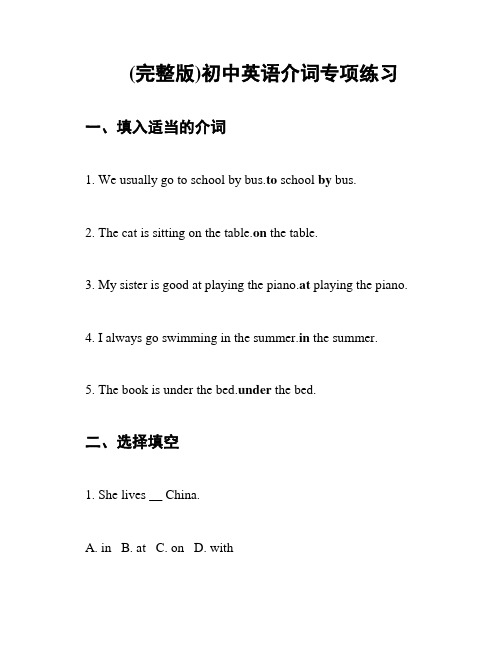
(完整版)初中英语介词专项练习一、填入适当的介词1. We usually go to school by bus.to school by bus.2. The cat is sitting on the table.on the table.3. My sister is good at playing the piano.at playing the piano.4. I always go swimming in the summer.in the summer.5. The book is under the bed.under the bed.二、选择填空1. She lives __ China.A. inB. atC. onD. with2. We arrived __ the airport late.A. onB. atC. toD. inA. onB. atC. inD. toA. onB. atC. inD. with5. Tim got a present __ his parents.A. inB. onC. fromD. with三、使用正确的介词完成句子1. I'm going __ the park __ my friends this afternoon.2. The movie starts __ 8 o'clock, so we need to be there __ time.3. Don't forget to turn __ the lights __ you leave the room.4. She's studying __ the library because it's quiet __.5. There is a beautiful garden __ the back __ our house.四、将下列句子翻译成英语1. 我住在一座小镇上。
初一英语介词练习题30题
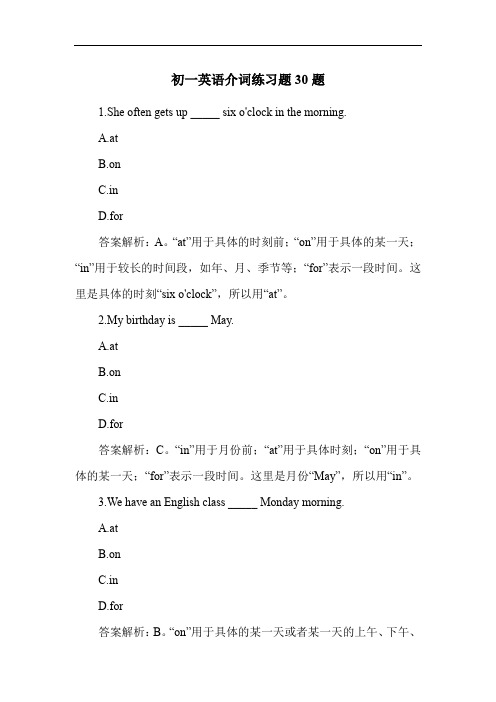
初一英语介词练习题30题1.She often gets up _____ six o'clock in the morning.A.atB.onC.inD.for答案解析:A。
“at”用于具体的时刻前;“on”用于具体的某一天;“in”用于较长的时间段,如年、月、季节等;“for”表示一段时间。
这里是具体的时刻“six o'clock”,所以用“at”。
2.My birthday is _____ May.A.atB.onC.inD.for答案解析:C。
“in”用于月份前;“at”用于具体时刻;“on”用于具体的某一天;“for”表示一段时间。
这里是月份“May”,所以用“in”。
3.We have an English class _____ Monday morning.A.atB.onC.inD.for答案解析:B。
“on”用于具体的某一天或者某一天的上午、下午、晚上;“at”用于具体时刻;“in”用于较长时间段;“for”表示一段时间。
这里是“Monday morning”,具体某天的上午,用“on”。
4.My father goes to work _____ 8:00.A.atB.onC.inD.for答案解析:A。
“at”用于具体时刻;“on”用于具体某一天;“in”用于较长时间段;“for”表示一段时间。
这里是具体时刻“8:00”,用“at”。
5.I often do my homework _____ the evening.A.atB.onC.inD.for答案解析:C。
“in”用于上午、下午、晚上;“at”用于具体时刻;“on”用于具体某一天;“for”表示一段时间。
这里是“the evening”,用“in”。
6.The party is _____ Saturday evening.A.atB.onC.inD.for答案解析:B。
“on”用于具体的某一天的上午、下午、晚上;“at”用于具体时刻;“in”用于较长时间段;“for”表示一段时间。
初一英语介词用法练习题30题含答案解析
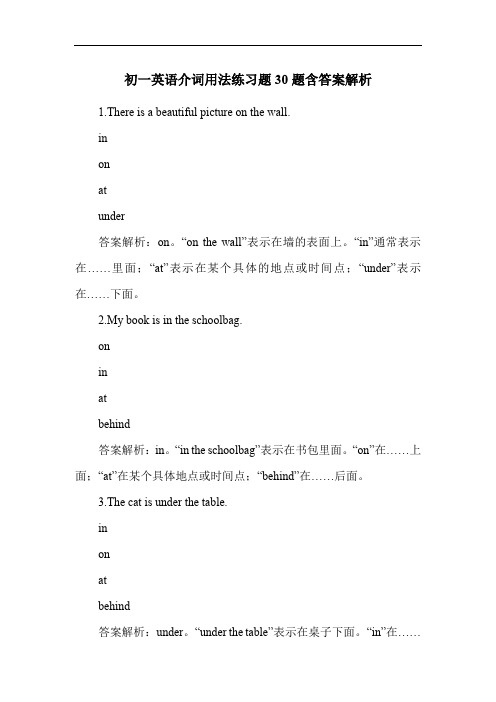
初一英语介词用法练习题30题含答案解析1.There is a beautiful picture on the wall.inonatunder答案解析:on。
“on the wall”表示在墙的表面上。
“in”通常表示在……里面;“at”表示在某个具体的地点或时间点;“under”表示在……下面。
2.My book is in the schoolbag.oninatbehind答案解析:in。
“in the schoolbag”表示在书包里面。
“on”在……上面;“at”在某个具体地点或时间点;“behind”在……后面。
3.The cat is under the table.inonatbehind答案解析:under。
“under the table”表示在桌子下面。
“in”在……里面;“on”在……上面;“at”在某个具体地点或时间点;“behind”在……后面。
4.We have a class at 8 o'clock.inonatbehind答案解析:at。
“at 8 o'clock”表示在具体的时间点用“at”。
“in”用于较长的时间段;“on”用于具体的某一天;“behind”在……后面。
5.The ball is behind the door.inonatunder答案解析:behind。
“behind the door”表示在门后面。
“in”在……里面;“on”在……上面;“at”在某个具体地点或时间点;“under”在……下面。
6.My birthday is in May.oninatbehind答案解析:in。
“in May”表示在某个月份用“in”。
“on”用于具体的某一天;“at”用于具体的时间点;“behind”在……后面。
7.There is a party on Sunday.inonatunder答案解析:on。
“on Sunday”表示在具体的某一天用“on”。
初一英语介词用法练习题50题(带答案)
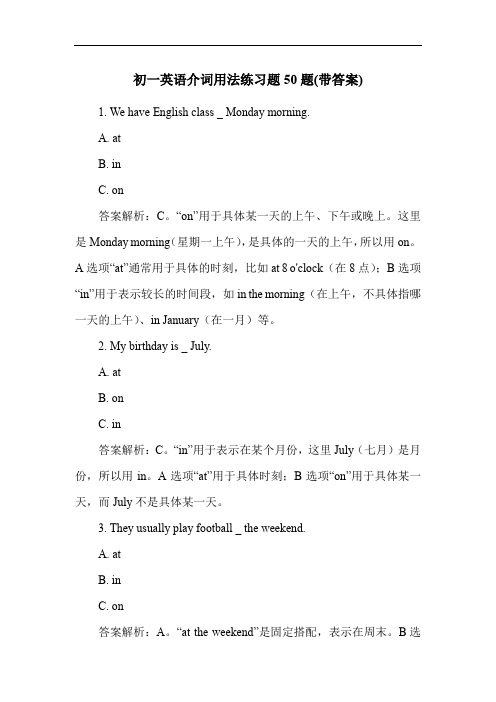
初一英语介词用法练习题50题(带答案)1. We have English class _ Monday morning.A. atB. inC. on答案解析:C。
“on”用于具体某一天的上午、下午或晚上。
这里是Monday morning( 星期一上午),是具体的一天的上午,所以用on。
A选项“at”通常用于具体的时刻,比如at 8 o'clock(在8点);B选项“in”用于表示较长的时间段,如in the morning(在上午,不具体指哪一天的上午)、in January 在一月)等。
2. My birthday is _ July.A. atB. onC. in答案解析:C。
“in”用于表示在某个月份,这里July( 七月)是月份,所以用in。
A选项“at”用于具体时刻;B选项“on”用于具体某一天,而July不是具体某一天。
3. They usually play football _ the weekend.A. atB. inC. on答案解析:A。
“at the weekend”是固定搭配,表示在周末。
B选项“in”不能这样搭配;C选项“on”虽然有“on weekend”的用法,但通常表示特定的某个周末,这里“usually”表示通常情况,用“at the weekend”更合适。
4. The meeting starts _ 9:00.A. atB. inC. on答案解析:A。
“at”用于具体的时刻,9:00是具体的时刻,所以用at。
B选项“in”用于较长时间段;C选项“on”用于具体某一天。
5. She was born _ a cold winter night.A. atB. inC. on答案解析:C。
“on”用于具体某一天的晚上,这里a cold winter night(一个寒冷的冬夜)是具体的一个晚上,所以用on。
A选项“at”用于具体时刻;B选项“in”用于较长时间段。
初一英语介词用法总结练习题20题(答案解析)
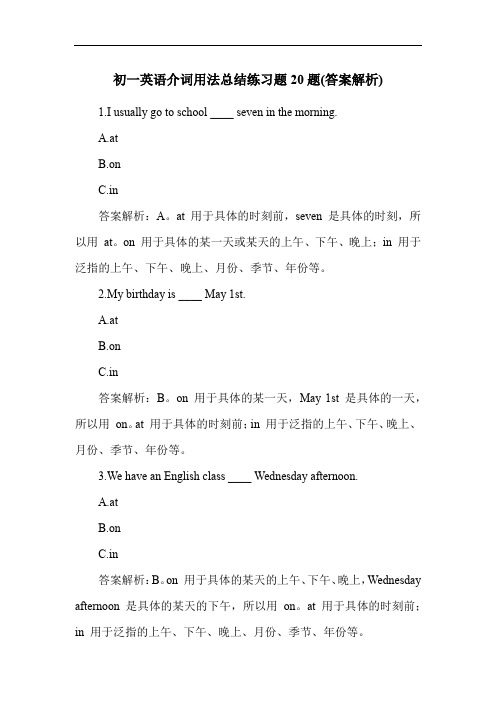
初一英语介词用法总结练习题20题(答案解析)1.I usually go to school ____ seven in the morning.A.atB.onC.in答案解析:A。
at 用于具体的时刻前,seven 是具体的时刻,所以用at。
on 用于具体的某一天或某天的上午、下午、晚上;in 用于泛指的上午、下午、晚上、月份、季节、年份等。
2.My birthday is ____ May 1st.A.atB.onC.in答案解析:B。
on 用于具体的某一天,May 1st 是具体的一天,所以用on。
at 用于具体的时刻前;in 用于泛指的上午、下午、晚上、月份、季节、年份等。
3.We have an English class ____ Wednesday afternoon.A.atB.onC.in答案解析:B。
on 用于具体的某天的上午、下午、晚上,Wednesday afternoon 是具体的某天的下午,所以用on。
at 用于具体的时刻前;in 用于泛指的上午、下午、晚上、月份、季节、年份等。
4.My father often goes to work ____ eight o'clock.A.atB.onC.in答案解析:A。
at 用于具体的时刻前,eight o'clock 是具体的时刻,所以用at。
on 用于具体的某一天或某天的上午、下午、晚上;in 用于泛指的上午、下午、晚上、月份、季节、年份等。
5.The meeting will start ____ three o'clock this afternoon.A.atB.onC.in答案解析:A。
at 用于具体的时刻前,three o'clock this afternoon 是具体的时刻,所以用at。
on 用于具体的某一天或某天的上午、下午、晚上;in 用于泛指的上午、下午、晚上、月份、季节、年份等。
初一英语介词用法练习题50题含答案解析

初一英语介词用法练习题50题含答案解析1.She has an English class ____ Monday morning.A.atB.inC.on答案解析:C。
在具体某一天的上午、下午或晚上用介词on。
at 通常用于具体的时刻,in 用于较长的时间段,如年、月、季节等。
2.My birthday is ____ July.A.atB.inC.on答案解析:B。
在月份前用介词in。
at 用于具体时刻,on 用于具体某一天或某一天的上午、下午、晚上。
3.He often gets up ____ six o'clock.A.atB.inC.on答案解析:A。
在具体时刻前用介词at。
in 和on 不用于具体时刻。
4.We have a sports meeting ____ spring.A.atB.in答案解析:B。
在季节前用介词in。
at 用于具体时刻,on 用于具体某一天或某一天的上午、下午、晚上。
5.The party is ____ the evening of Sunday.A.atB.inC.on答案解析:C。
在具体某一天的晚上用介词on。
at 用于具体时刻,in 用于较长的时间段。
6.She does her homework ____ the afternoon.A.atB.inC.on答案解析:B。
在下午用in the afternoon。
at 用于具体时刻,on 用于具体某一天的下午。
7.They go to the park ____ Sunday afternoon.A.atB.inC.on答案解析:C。
在具体某一天的下午用介词on。
at 用于具体时刻,in 用于较长的时间段。
8.The concert is ____ 8:00 pm.B.inC.on答案解析:A。
在具体时刻前用介词at。
in 和on 不用于具体时刻。
9.The school trip is ____ October.A.atB.inC.on答案解析:B。
初一英语介词用法练习题50题答案解析版
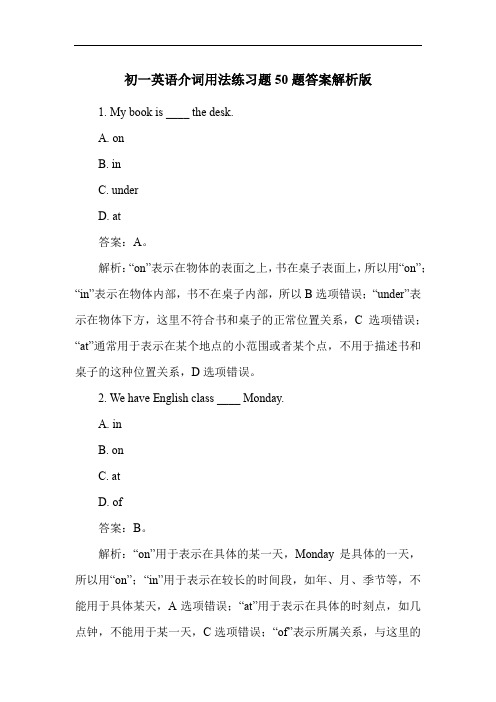
初一英语介词用法练习题50题答案解析版1. My book is ____ the desk.A. onB. inC. underD. at答案:A。
解析:“on”表示在物体的表面之上,书在桌子表面上,所以用“on”;“in”表示在物体内部,书不在桌子内部,所以B选项错误;“under”表示在物体下方,这里不符合书和桌子的正常位置关系,C选项错误;“at”通常用于表示在某个地点的小范围或者某个点,不用于描述书和桌子的这种位置关系,D选项错误。
2. We have English class ____ Monday.A. inB. onC. atD. of答案:B。
解析:“on”用于表示在具体的某一天,Monday是具体的一天,所以用“on”;“in”用于表示在较长的时间段,如年、月、季节等,不能用于具体某天,A选项错误;“at”用于表示在具体的时刻点,如几点钟,不能用于某一天,C选项错误;“of”表示所属关系,与这里的时间表达无关,D选项错误。
3. The library is ____ the teaching building.A. next toB. betweenC. amongD. inside答案:A。
解析:“next to”表示紧挨着、在旁边,图书馆和教学楼是紧挨着的关系,所以A选项正确;“between”表示在两者之间,这里没有提及两者之间的关系,B选项错误;“among”表示在三者或三者以上之中,不符合题意,C选项错误;“inside”表示在内部,图书馆通常是独立于教学楼外部紧挨着的建筑,D选项错误。
4. She gets up ____ six o'clock every day.A. inB. onC. atD. for答案:C。
解析:“at”用于表示在具体的时刻点,这里是六点这个具体时刻,所以用“at”;“in”用于表示在较长时间段,A选项错误;“on”用于表示具体某一天,B选项错误;“for”表示目的或者持续的一段时间,与这里的起床时间表达无关,D选项错误。
初一英语介词用法总结练习题20题含答案解析
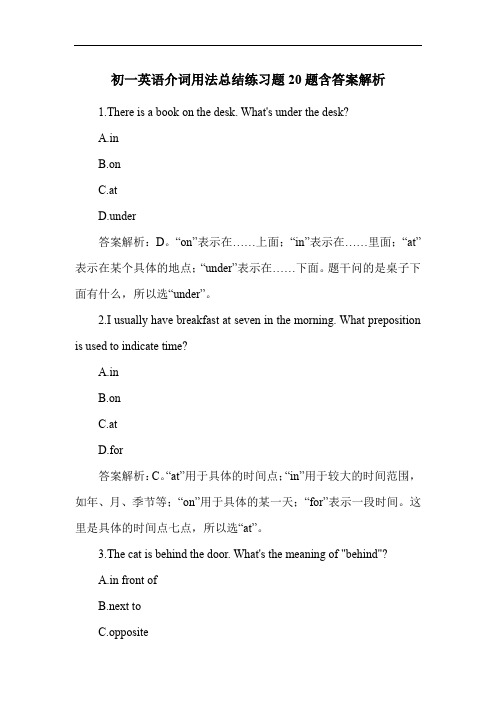
初一英语介词用法总结练习题20题含答案解析1.There is a book on the desk. What's under the desk?A.inB.onC.atD.under答案解析:D。
“on”表示在……上面;“in”表示在……里面;“at”表示在某个具体的地点;“under”表示在……下面。
题干问的是桌子下面有什么,所以选“under”。
2.I usually have breakfast at seven in the morning. What preposition is used to indicate time?A.inB.onC.atD.for答案解析:C。
“at”用于具体的时间点;“in”用于较大的时间范围,如年、月、季节等;“on”用于具体的某一天;“for”表示一段时间。
这里是具体的时间点七点,所以选“at”。
3.The cat is behind the door. What's the meaning of "behind"?A.in front ofB.next toC.oppositeD.at the back of答案解析:D。
“in front of”表示在……前面;“next to”表示在……旁边;“opposite”表示在……对面;“at the back of”表示在……后面。
题干中猫在门后面,所以选“at the back of”。
4.My school is near my home. What's the meaning of "near"?A.far fromB.close toC.next toD.in front of答案解析:B。
“far from”表示离……远;“close to”表示离……近;“next to”表示紧挨着;“in front of”表示在……前面。
- 1、下载文档前请自行甄别文档内容的完整性,平台不提供额外的编辑、内容补充、找答案等附加服务。
- 2、"仅部分预览"的文档,不可在线预览部分如存在完整性等问题,可反馈申请退款(可完整预览的文档不适用该条件!)。
- 3、如文档侵犯您的权益,请联系客服反馈,我们会尽快为您处理(人工客服工作时间:9:00-18:30)。
初一英语期中语法复习—介词
根据句意,用适当的介词填空
1.She usually gets to school 7:30 in the morning.
2.Can you come here the morning of April 5?
3.Some of my classmates were born May, 1982.
4.It is often too hot summer in China.
5.The girl left her home a cold winter evening.
6.He has lived here 1980.
7.We have worked in this city about 5 years.
8.My father usually goes to bed at ten night.
9.What do the students do Monday afternoon?
10.I must go now. My parents are waiting me at the bus stop.
11.My pen pal lives Sydney, Australia.
12.Lucy is a good student. She often helps her classmates
their lessons.
13.The old woman often goes out a walk after supper.
14.Most us are doing very well maths.
15.Don’t forget to say “Thank you” when someone opens the door you.
16.Hawaii is famous its beautiful beaches.
17.I won’t believe you until I see it my own eyes.
18.I have borrowed some books our school library.
19.How far is it Sydney Beijing?
20.Is there anything wrong your computer?
21.The train is passing a tunnel.
22.It’s a big house an interesting swimming pool.
23.There is a map and some pictures the wall in our classroom.
24.Look! Lily is lying the beach and enjoying the sun.
25.Don’t treat him a child.
“”
“”
At the end, Xiao Bian gives you a passage. Minand once said, "people who learn to learn are very happy people.". In every wonderful life, learning is an eternal theme. As a professional clerical and teaching position, I understand the importance of continuous learning, "life is diligent, nothing can be gained", only continuous learning can achieve better self. Only by constantly learning and mastering the latest relevant knowledge, can employees from all walks of life keep up with the pace of enterprise development and innovate to meet the needs of the market. This document is also edited by my studio professionals, there may be errors in the document, if there are errors, please correct, thank you!。
